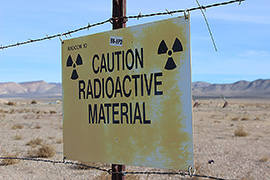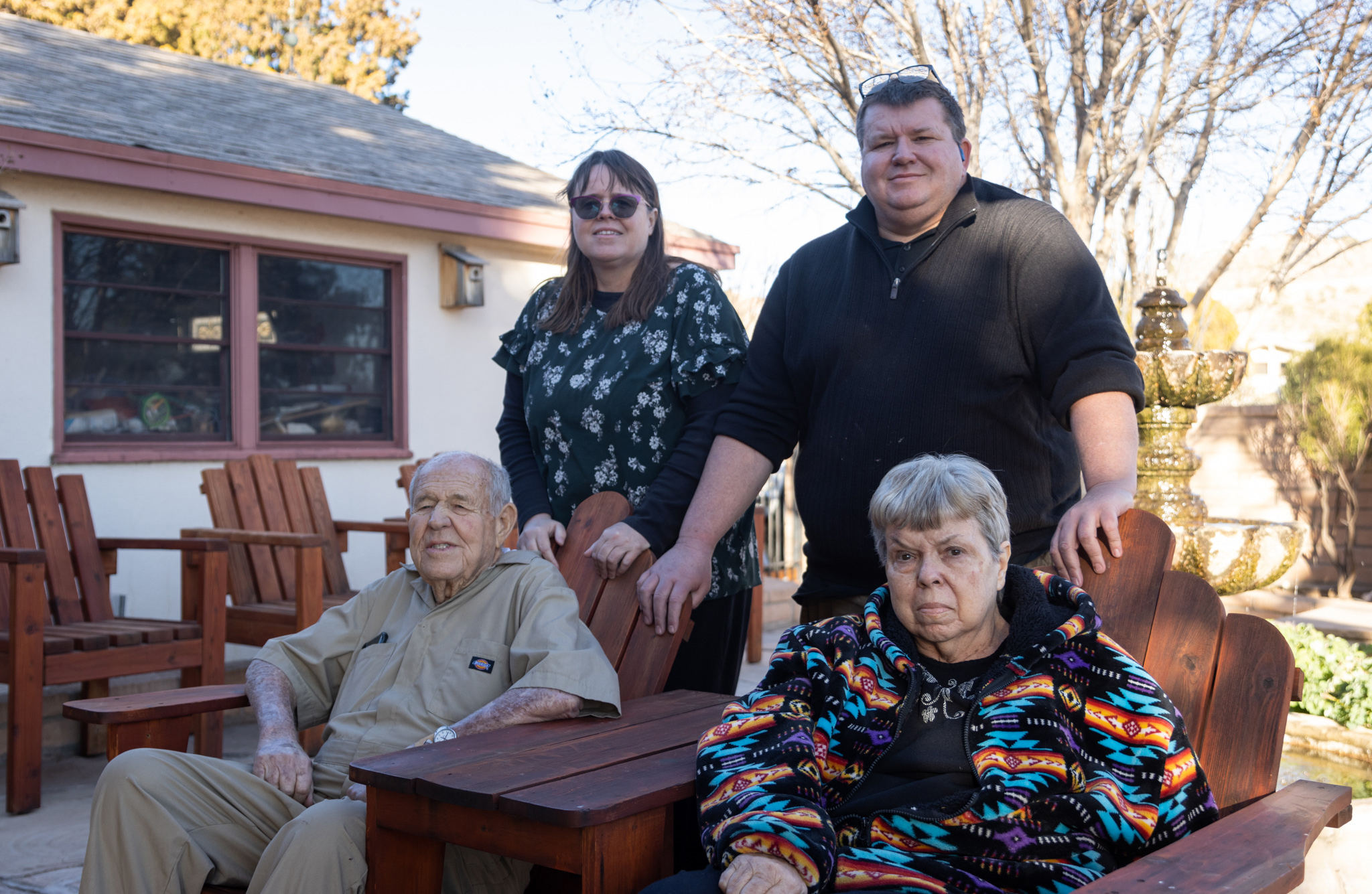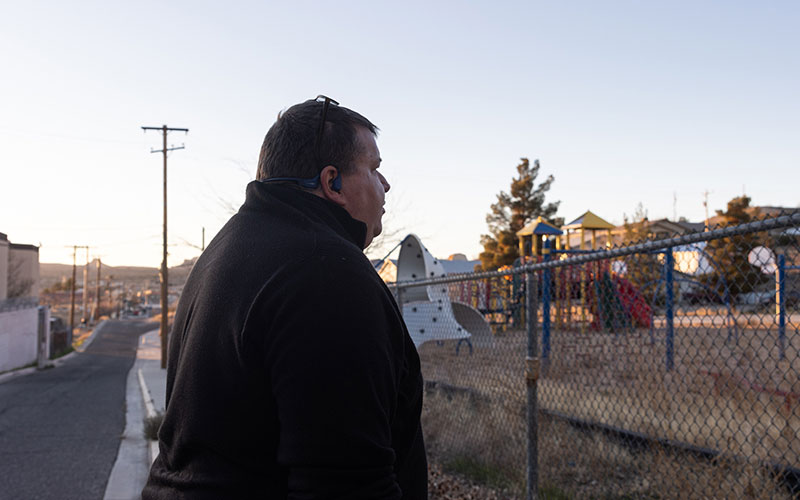- Slug: BC-CNS-Downwind Downtrodden,1130.
- 3 file photos available (thumbnails, captions below)
By Lillie Boudreaux
Cronkite News
PHOENIX – The $1.2 trillion budget package that Congress was working to pass Friday included everything from protection for gas stoves to restrictions on payments to the Chinese government.
What it didn’t include was an extension for the Radiation Exposure Compensation Act, which compensates people who lived downwind from nuclear test sites and developed cancer as a result.
Family members of such “downwinders,” like Cullin Pattillo of Mohave County, said they felt “disgust” at Congress’ lack of action.
“It’s something that’s affecting real people who were really harmed, you know, it’s not an abstract concept that you should be able to so easily push aside,” Pattillo said. “It makes me angry. It makes me extremely angry.”
The House – which is out for the next two weeks on an Easter recess – still has a chance to extend RECA before the law expires on June 7. That is little comfort to Pattillo, whose father died from cancer in 2022 after years of fighting for compensation from the government.
“People are dying every single day they delay this,” Pattillo said. “My dad died fighting for coverage.”
The Senate passed a bill earlier this month that would not only reauthorize RECA but expand benefits to cover downwinders in New Mexico, northern Utah and Arizona who are not currently covered in the law.
The law, originally passed in 1990, covered uranium miners as well as people who lived in specified parts of Nevada, Utah and Arizona that were downwind of the Nevada Test Site where the government tested nuclear weapons for years in the 1950s and 1960s. Residents of those areas who developed one of a number of cancers listed in the law were entitled to $50,000 of compensation.
Over the years, the law was expanded to include other areas and occupations such as uranium mill workers. But although it includes virtually all of northern Arizona, it has never included Mohave County residents south of the Grand Canyon.
The Senate bill, currently before the House, would expand coverage to all of Mohave County and to other states. But 15 House members – including several from Arizona – had hoped to expedite passage by attaching the Senate language to Friday’s budget package.
Failure to include RECA in the budget bill was called “irresponsible” by Rep. Paul Gosar, R-Bullhead City, whose district includes Mohave County.
“The federal government has an obligation to take care of the survivors of nuclear weapons testing that occurred during the Cold War,” Gosar said in a statement Friday.
Rep. Greg Stanton, D-Phoenix, who was one of the 15 calling for RECA to be part of the budget, called it a matter of “fundamental fairness” in an interview Wednesday.
“We’ve got to get it done for the people that suffered unknowingly because of actions of the federal government,” Stanton said. “We need to make sure that the RECA system, which is a good program … actually reaches all the people that have been touched by the nuclear testing.”
Mohave County had the highest rates of new cancer cases and cancer deaths in Arizona from 2016 to 2020, according to the Centers for Disease Control and Prevention, with a new case rate of 401.2 per 100,000 residents and a death rate of 178.5 per 100,000. The state rates in the same period were 376.6 for cases and 132 for deaths.
Matthew Capalby, who was born and raised in Kingman, said the massive mushroom clouds from above-ground nuclear tests were visible all the way in Arizona and became a “Fourth of July patriotic thing” for residents of the area like his mother.
“They would let folks know when blasts were going to occur, but it was like they were encouraged to watch it,” Capalby said. “They would literally take the school kids out of school, take them out on the playground to watch the blast off in the distance.”
Capalby said he constantly saw friends and family members develop cancer.
“I just assumed when you reached your 30s you were going to probably get cancer. I thought that was a normal thing,” he said. “And then, come to find out that a lot of this was due to the radioactive fallout and exposure from … the Nevada Test Site.”
Capalby said those experiences prompted him to spend years advocating for downwinders, serving at one point on the board of a group called Downwinders of Mohave County. Now, he is the only surviving board member.
“It’s just been a very slow, quiet ongoing tragedy and it decimated the population and two generations of people throughout the region,” he said.
Kingman is a little more than 100 miles from the Nevada Test Site where the United States conducted 100 at-or-above ground level atomic weapons tests “resulting in radioactive material being released into the atmosphere,” according to the Congressional Research Service.
Pattillo said his father, a Kingman resident, survived stage 4 bladder cancer in the 1990s and later developed colon cancer. He had his bladder and prostate removed, colon resected, multiple surgeries on his liver and an “uncountable” number of radiation and chemotherapy treatments before dying of cancer in 2022.
Pattillo said the three decades of treatment added up to more than $1 million in medical bills. But even though all of his father’s cancers are on the RECA list, he was never compensated because Kingman is not a covered area.
“Mohave County is not that far from the testing area, and southern Mohave County was specifically overlooked and more specifically excluded from the Radiation Exposure Compensation Act,” he said. “Just as a matter of fairness, there’s an issue in my mind there.”
Pattillo said it was not just his father: His grandfather died of chronic lymphocytic leukemia and an aunt died of cancer that was “just everywhere.”
“The United States government, for all intents and purposes, murdered people,” Pattillo said. “They murdered our dad. They murdered my aunt, and they probably murdered my grandpa. And I’m sick and tired of them ignoring the issue.”
Advocates are optimistic that the House will be able to extend RECA before it expires, despite the fact that the measure was not included in the budget.
“It’s always easier in Congress to keep a program alive than it is to revive one,” said Kevin Davis, a lobbyist for the Union of Concerned Scientists. “So it’s much, much easier to reauthorize than it is to create a new one.”
The White House has said it “looks forward to working with Congress to ensure sufficient resources are made available to cover the costs of administering the expanded benefits program.”
But downwinders like Pattillo said they are tired of waiting to Congress to act.
“What a better poster child for, you know, dysfunction of governments and dysfunction in Congress,” he said.
For more stories from Cronkite News, visit cronkitenews.azpbs.org.
^__=
Web links:
_ RECA: https://www.justice.gov/civil/common/reca
_ RECA reauthorization: https://www.congress.gov/118/bills/s3853/BILLS-118s3853es.pdf
_ House letter: https://gosar.house.gov/uploadedfiles/house_reca_letter.pdf
_ CDC cancers: https://gis.cdc.gov/Cancer/USCS/#/StateCountyTerritory/
_ CRS report: https://sgp.fas.org/crs/misc/R43956.pdf
^__=
For decades, the U.S. has compensated “downwinders” – people who developed cancers as a result of the radiation from nuclear weapons testing in Nevada. But that law is set to expire in June, and an effort to push the renewal through as part of the federal budget fell through this week. (File photo by Jessica Boehm/Cronkite News)
Cullin Pattillo, standing right, with his sistr Kim and their parents, Eddie and Mary Jane Pattillo, at their home in February 2022. Eddie Pattillo died just months later. (File photo by Monserrat Apud /Cronkite News)
Cullin Pattillo, in a 2022 photo, points to the playground where he said his father watched atomic mushroom clouds as a child. (File photo by Monserrat Apud /Cronkite News)


